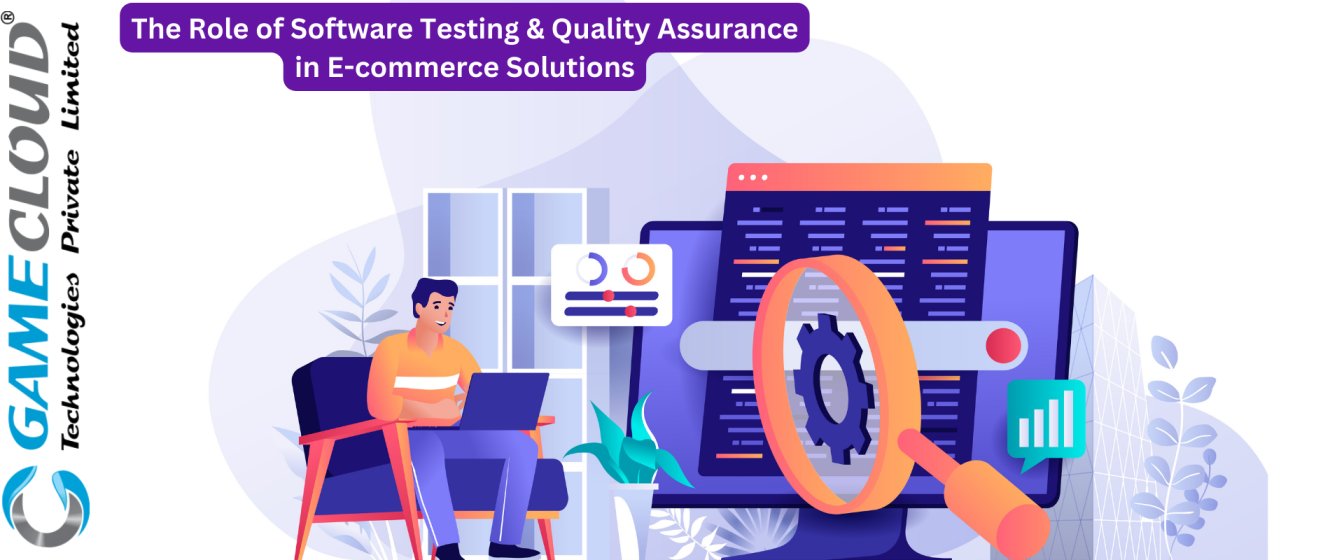
In today’s digital landscape, e-commerce has become an integral part of our daily lives. With the rise of online shopping, the demand for seamless and secure e-commerce experiences has increased exponentially. Ensuring the quality of these experiences is crucial for businesses to maintain customer trust and loyalty. This is where software testing and quality assurance (QA) play a vital role. In this blog, we will delve into the importance of software testing and QA in e-commerce solutions, exploring both current trends and futuristic predictions.
Ensuring Performance: The Backbone of E-commerce
Performance testing is a crucial component of software testing in e-commerce. It involves evaluating the behavior of an e-commerce platform under various scenarios, such as user concurrency and peak traffic. This ensures that the platform can handle increased loads without compromising on speed and responsiveness. In this section, we will delve deeper into the importance of performance testing in e-commerce and explore its various aspects.
Performance testing is vital for e-commerce platforms because it helps ensure that the platform can handle the increased load without compromising on speed and responsiveness. A study by Gartner found that a 1-second delay in page load time can result in a 7% reduction in conversions. This highlights the significance of performance testing in e-commerce, where even minor delays can have a substantial impact on conversions and ultimately, revenue.
There are several types of performance testing that can be applied to e-commerce platforms. These include:
- Load Testing: This involves simulating a normal workload to assess how the application performs under typical conditions. Load testing can help identify patterns in application latency and performance.
- Endurance Testing: Also known as soak testing, this type of testing assesses how the application performs over a long period under constantly varying workloads. Endurance testing helps identify performance issues that may arise due to prolonged usage.
- Stress Testing: This involves exposing the application to heavy workload conditions to identify which components are most likely to fail. Stress testing helps understand the robustness of the online store in the face of high traffic volume.
- Spike Testing: This type of testing involves suddenly and significantly increasing the workload volume to test how well the application can handle unexpected spikes in traffic. Spike testing helps identify how much traffic the application can handle before performance issues start to occur.
Performance testing offers several benefits to e-commerce platforms. These include:
- Improved Customer Experience: By ensuring that the platform can handle increased loads without compromising on speed and responsiveness, performance testing helps provide a seamless customer experience.
- Increased Conversions: By reducing page load times and improving overall performance, performance testing can lead to increased conversions and ultimately, revenue.
- Reduced Bounce Rates: Performance testing helps identify and resolve performance issues that may cause customers to abandon their shopping carts, leading to reduced bounce rates.
- Enhanced Brand Reputation: By providing a seamless customer experience, performance testing helps enhance the brand reputation and build trust with customers.
- Cost Savings: Identifying and resolving performance issues early on can save costs associated with fixing issues after the platform is live.

Security Testing: The Shield Against Cyber Threats
Security testing is a critical component of software testing in e-commerce. It involves identifying vulnerabilities in the platform and ensuring compliance with industry standards and regulations. This is particularly crucial in e-commerce, where sensitive customer data is involved. In this section, we will delve deeper into the importance of security testing in e-commerce and explore its various aspects.
Security testing is vital for e-commerce platforms because it helps protect sensitive customer data from cyber threats. A recent study by IBM found that 60% of businesses that experienced a data breach went out of business within six months. This highlights the significance of security testing in e-commerce, where even minor security lapses can have devastating consequences.
There are several types of security testing that can be applied to e-commerce platforms. These include:
- Vulnerability Scanning: This involves using automated tools to scan the website for known security vulnerabilities such as outdated software, weak passwords, and misconfigured servers.
- Penetration Testing: This type of testing simulates attacks on the website to identify potential security vulnerabilities. Penetration testing helps understand how well the website can withstand real-world attacks.
- Security Code Reviews: This involves manually analyzing the website’s source code to identify potential vulnerabilities and coding errors.
- Network Security Testing: This type of testing assesses the security of the website’s network infrastructure to identify potential vulnerabilities that hackers can exploit.
Security testing offers several benefits to e-commerce platforms. These include:
- Protection of Customer Data: Security testing helps protect sensitive customer data from cyber threats, ensuring that customer trust and loyalty are maintained.
- Compliance with Regulations: Security testing ensures compliance with industry standards and regulations, such as the Payment Card Industry Data Security Standard (PCI DSS).
- Reduced Risk of Financial Losses: By identifying and addressing security vulnerabilities, security testing reduces the risk of financial losses due to security breaches.
- Enhanced Brand Reputation: Security testing helps maintain a positive brand reputation by ensuring that the website is secure and trustworthy.
Improved Customer Trust: Security testing helps build customer trust by ensuring that the website is secure and protected from cyber threats.
Integrations with Third-Party Systems and Payment Platforms
Integrations with third-party systems and payment platforms are critical components of e-commerce solutions. These integrations must be thoroughly tested to ensure seamless interactions and prevent errors. In this section, we will delve deeper into the importance of integrations with third-party systems and payment platforms in e-commerce and explore their various aspects.
Why Integrations with Third-Party Systems and Payment Platforms are Important
Integrations with third-party systems and payment platforms are crucial for e-commerce businesses because they enable the seamless interaction between different systems and platforms. This ensures that the checkout process is smooth and efficient, reducing the likelihood of errors and abandonment of shopping carts. A study by Forrester found that 80% of customers will abandon their shopping carts if the checkout process is too complicated. This highlights the significance of integrations with third-party systems and payment platforms in e-commerce.
Ensuring Usability and Accessibility
Usability and accessibility testing are critical components of software testing in e-commerce. These tests ensure that the platform is user-friendly and accessible to customers with disabilities. In this section, we will delve deeper into the importance of usability and accessibility testing in e-commerce and explore their various aspects.
Usability and accessibility testing are crucial for e-commerce platforms because they ensure that the platform is user-friendly and accessible to customers with disabilities. A study by the World Wide Web Consortium found that 80% of websites have detectable accessibility errors. This highlights the significance of usability and accessibility testing in e-commerce, where even minor usability and accessibility issues can have a substantial impact on customer satisfaction and loyalty.
Usability Principles for E-commerce Platforms include:
- Clear Visual Hierarchy: Websites should have a logical and visually nested structure, with important elements being prominently displayed for easy navigation.
- Divided Pages: Clear divisions on pages help users decide where to focus their attention, enhancing the overall user experience.
- Clickable Parts Identification: Easy identification of clickable elements is crucial for intuitive navigation and seamless interaction.
- Reduced Visual Noise: Minimizing distractions on the website improves user focus and engagement.
- Consistent Conventions: Adhering to common website conventions ensures familiarity and ease of use for customers.
Accessibility considerations for e-commerce platforms are as follows:
- Video Integration: Providing captions and subtitles in videos enhances accessibility for users with hearing impairments.
- Crowdsourced Testing: Utilizing temporary workforce participants for accessibility testing ensures a diverse representation of real users.
- Inexpensive Implementations: Accessibility features are cost-effective and add significant value to the user experience.
- Clear Pathways to Products: Websites should offer clear and straightforward pathways for users to explore and purchase products.
Agility and Performance
Agility and performance testing are critical components of software testing in e-commerce. These tests ensure that the platform can adapt to changing user behavior and handle increased traffic without compromising on performance. For instance, a study by Akamai found that 40% of customers will abandon their shopping carts if the website takes more than 3 seconds to load.
Cross-Device/Browser Compatibility
Cross-device and browser compatibility testing are essential aspects of software testing in e-commerce. These tests ensure that the platform works seamlessly across various devices and browsers. For example, a study by Google found that 61% of customers use multiple devices to shop online.
Current Landscape
- E-commerce Sales: E-commerce sales continue to grow, with global sales projected to reach $6.5 trillion by 2023.
- Mobile Commerce: Mobile commerce is becoming increasingly popular, with 72% of customers using mobile devices to shop online.
- Social Media Integration: Social media integration is becoming increasingly important in e-commerce, with 71% of customers using social media to research products.
- Customer Experience: Customer experience is becoming increasingly important in e-commerce, with 80% of customers willing to pay more for a better experience.
- Data Analytics: Data analytics is becoming increasingly important in e-commerce, with 85% of businesses using data analytics to inform their marketing strategies.
- Cybersecurity: Cybersecurity is becoming increasingly important in e-commerce, with 60% of businesses experiencing a data breach in the past year.
- Supply Chain Management: Supply chain management is becoming increasingly important in e-commerce, with 75% of businesses using supply chain management software to streamline their operations.

Ankatmak and QualityReality leading in this regards
Ankatmak, a division of the renowned GameCloud Technologies Pvt Ltd, is a pioneer in the field of AI outsourcing, prompt engineering, and IT consultancy. With a focus on delivering cutting-edge AI solutions, Ankatmak offers a wide range of services, including software and mobile app development, website development, custom software solutions, IT consulting, cloud services, software testing and quality assurance, AI & ChatBot consulting, data analytics and business intelligence, IT support, e-commerce solutions, digital marketing, training and education, and virtual assistants. Our team of 70+ dedicated professionals, equipped with skills in research, design, and development, works as the backend team of GameCloud Technologies, leveraging the company’s decade-plus expertise in the field.
We’re contributing significantly to the AI landscape by providing AI-assisted content creation and engineering services. Our AI-powered tools and algorithms can generate high-quality, coherent, and contextually relevant articles, blog posts, product descriptions, and more, saving time and resources for content creators. Our AI-assisted engineering services also streamline and automate content creation processes, enabling faster task completion and improved efficiency.
QualityReality, on the other hand, is contributing to the AI landscape through our in-house software testing and quality assurance services. By ensuring that AI-powered applications and solutions are thoroughly tested and optimized, we help to maintain the quality and reliability of Ankatmak’s offerings. Our expertise in software testing and quality assurance helps to identify and address potential issues early in the development process, reducing the risk of costly errors and ensuring that AI-powered solutions meet the highest standards of performance and reliability.
Conclusion
In conclusion, software testing and QA play a vital role in ensuring the quality of e-commerce solutions. By ensuring performance, security, integrations, usability, accessibility, agility, cross-device and browser compatibility, and advertising campaigns, businesses can maintain customer trust and loyalty. As the e-commerce landscape continues to evolve, businesses must stay ahead of the curve by adopting cutting-edge software testing and QA strategies.
